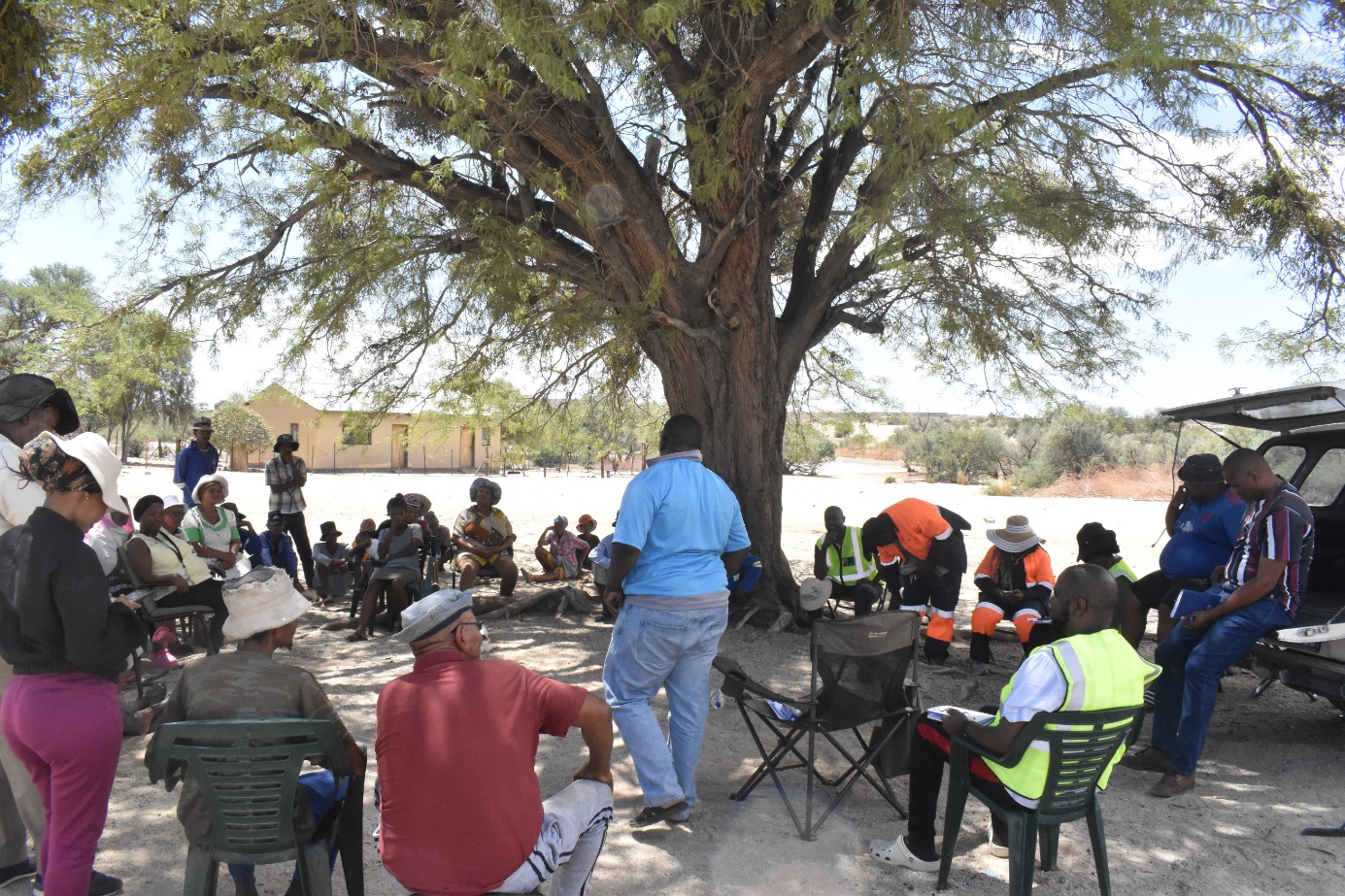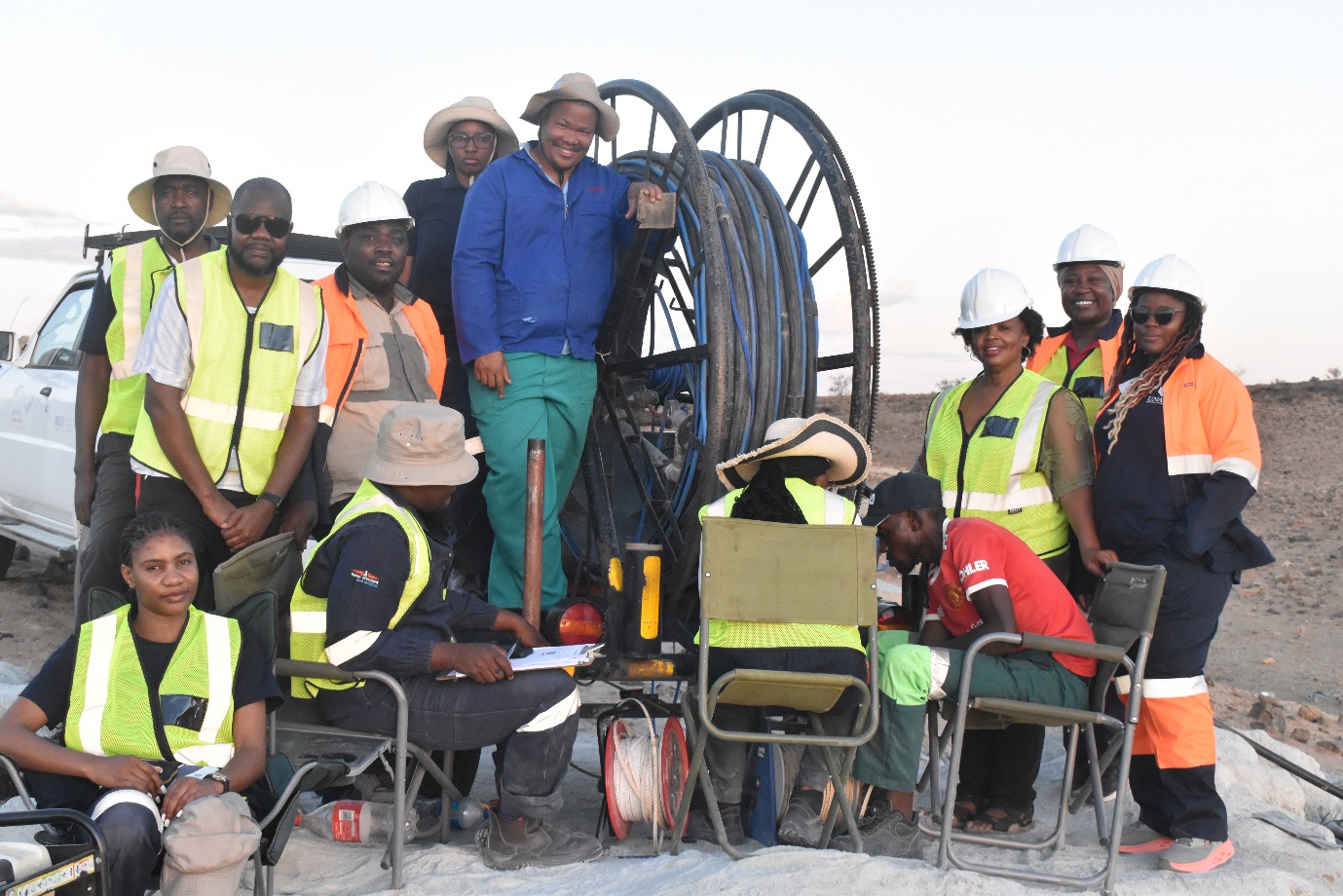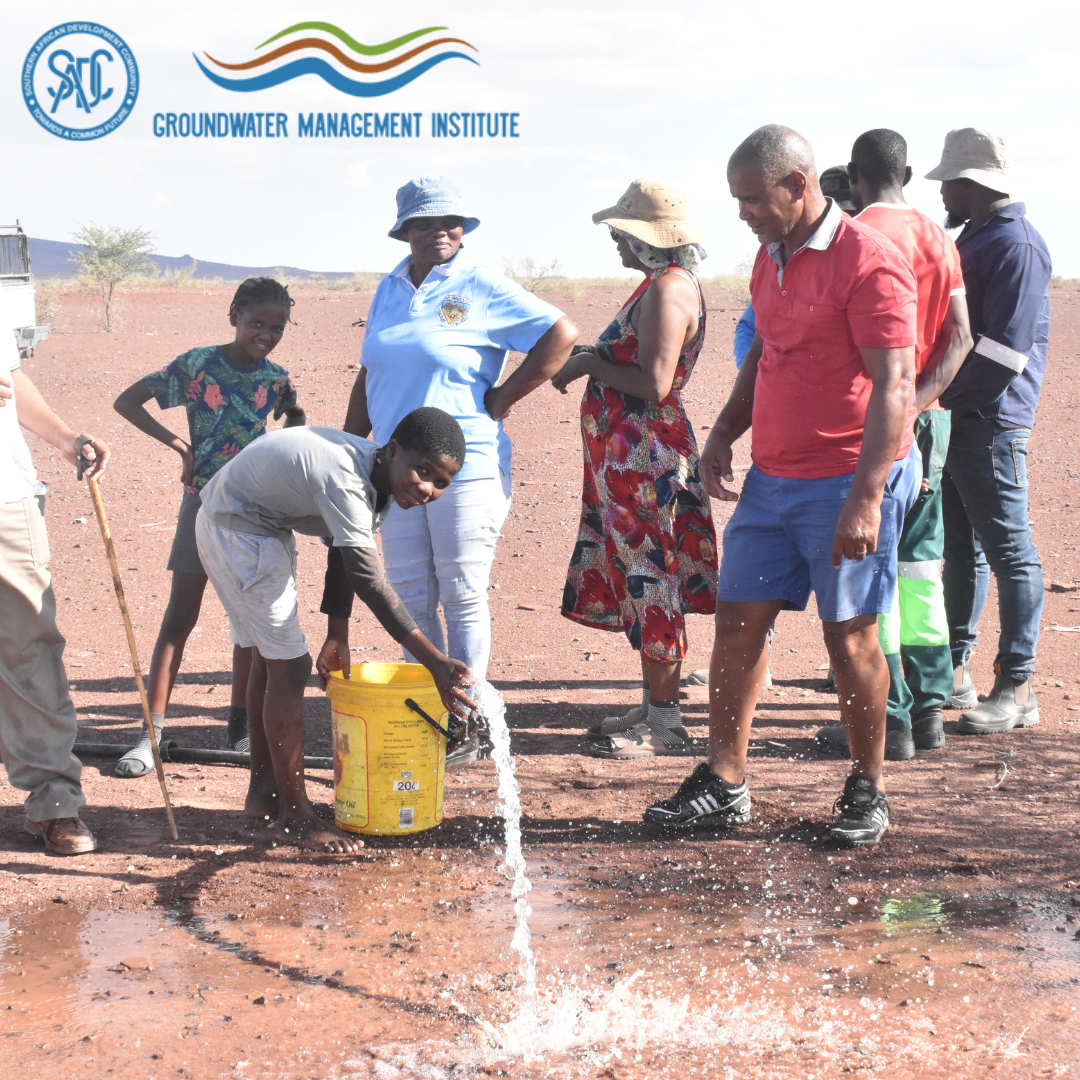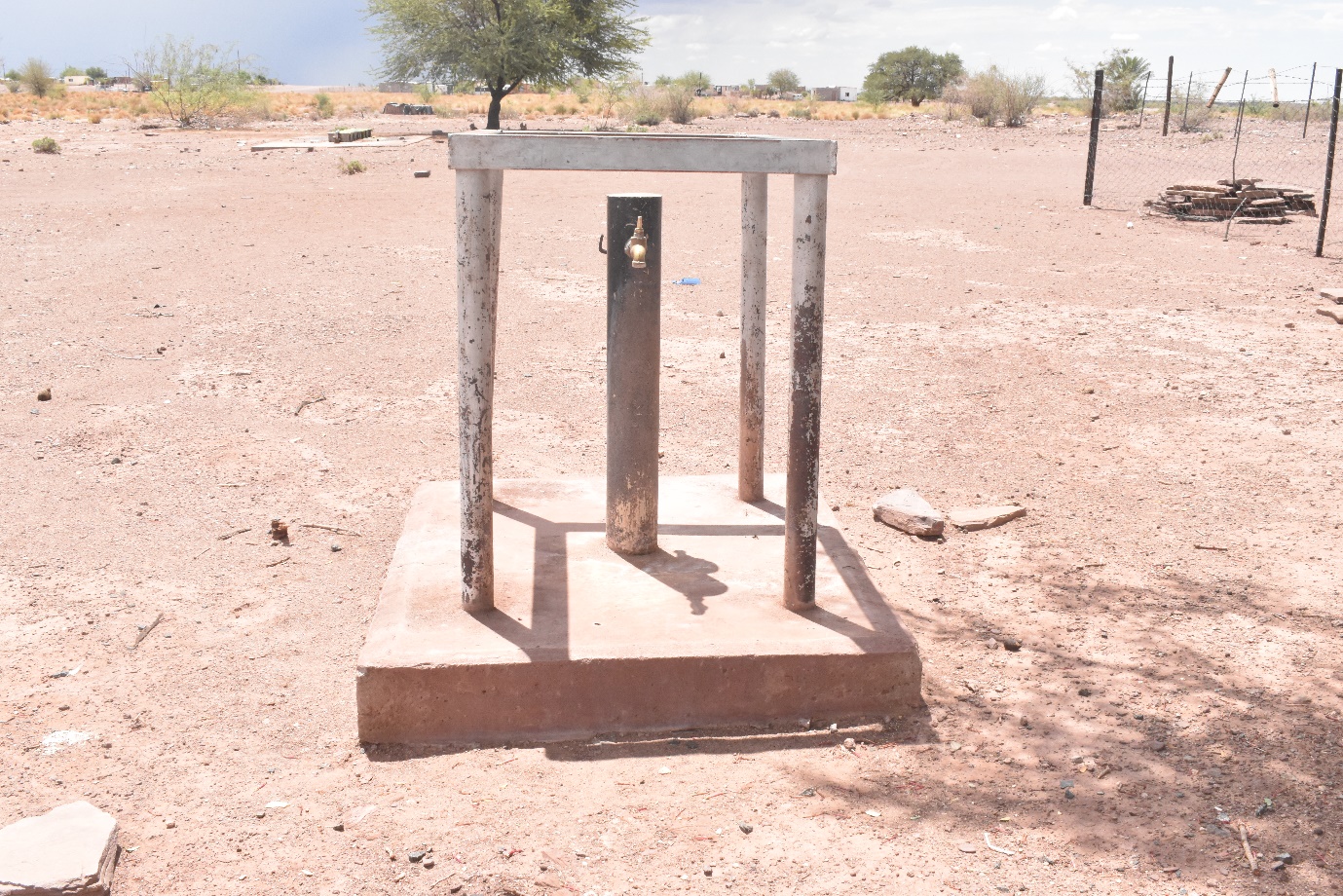This tap highlights the aging infrastructure within the community, which is set to be replaced by a new project.
Enhancing Sustainable Groundwater Use in Arid Southern Namibia /Karas Region: Towards understanding groundwater resource occurrence in the deep Karoo and the crystalline basement aquifers.
Arid regions worldwide face numerous challenges, but none are as pressing as the scarcity of fresh water. The situation is critical in Southern Namibia, particularly in the ||Karas region, with local communities heavily reliant on groundwater. The SADC Groundwater Management Institute, in collaboration with the Ministry of Agriculture, Water, and Land Reform and the University of Namibia, are spearheading a pivotal project to enhance sustainable groundwater use throughout this region. The Cooperation in International Waters in Africa (CIWA)/Global Environment Facility (GEF) funded project promotes sustainable and coordinated management of groundwater resources for improved livelihoods, ecosystem health, and economic development.
The ||Karas region is extremely arid, leading to dependence on groundwater sources. Communities predominantly access this vital resource from aging boreholes and small dams. Unfortunately, these dwindling supplies often fail to meet the communities’ water needs in Gabes, Gainachas, Betis, and Blouwes, thus exacerbating drinking water availability and livestock farming difficulties.
Strengthening Partnerships for Sustainable Development
In line with its Monitoring and Evaluation process, the Southern African Development Community Groundwater Management Institute (SADC-GMI) undertook an important site visit to assess project progress and provide essential technical support. From February 24 to 28, the SADC-GMI team collaborated with the University of Namibia and the Ministry of Agriculture, Water and Land Reform to engage directly with communities where the project is being implemented. The site visit underscores the SADC-GMI’s commitment to transparency, accountability, and community involvement in groundwater management initiatives.

During the stakeholder engagement session, the team heard about the community’s water challenges and gathered insights into their perspectives regarding the ongoing project.
During its recent field visit, the SADC-GMI team had the valuable opportunity to engage with residents of Gabes and Gainachas. This visit not only fostered community relations but illuminated pressing water challenges faced by these communities.
The discussions revealed a stark reality of how residents grapple with a significant lack of access to clean drinking water. This scarcity extends beyond individual households, significantly affecting local schools’ sustenance, agriculture, and sanitation facilities. The implications of this water crisis are profound, as they impact health, education, and overall quality of life.
Magdaline Brandt articulated a shared concern prevalent among community members: limited employment opportunities are deeply intertwined with stunted agricultural practices due to unreliable access to water. The ambitious dreams of subsistence farming through community gardening are thwarted, preventing families from cultivating essential food staples that support their livelihoods and ensure food security.
Edmund Vander Westhuizen echoed these sentiments and expressed his frustrations regarding livestock care. He emphasized how insufficient water threatens the health and well-being of animals and can lead to tragic outcomes, such as livestock deaths. This situation has wide-reaching implications for farmers like him who depend on their agricultural productivity for income and sustenance. He poignantly stated, “If only I had enough water for my animals to drink, my farming would thrive.”
Anton Isaac confirmed that the water crisis severely impacts access to education. In many instances, children are compelled to stay home due to the lack of water at schools, demonstrating the broader implications of this challenge. He noted, “Sometimes kids, particularly girls, would not go to school because of the lack of water.” This situation creates significant barriers for girls, who often bear the brunt of household responsibilities, including water collection. Despite their bleak realities, Magdaline, Edmund, and Isaac maintain a hopeful outlook for the future. They believe the ongoing project will bring about meaningful change in their community by addressing the fundamental need for reliable water sources.
Current Water Sources
Current water supply arrangements managed by the Rural Water Supply only allow two weekly visits to each village, which raises tensions over limited resources. While some relief is provided, competition intensifies amongst community members, highlighting the urgent need for more sustainable water-sourcing solutions.
Project Implementation and Community Benefits
The sustainable groundwater use project constitutes the drilling of four new production boreholes that will drastically improve water access in the area. A 103m deep borehole in Gabes has been drilled to serve about 100 households. In Gainachas, a 65m deep borehole has been drilled. The Betis community will benefit from a 70m deep borehole, while the Blouwes community will benefit from a 65m deep borehole. These developments aim to facilitate improved drinking water access and support livestock farming, addressing immediate survival needs and promoting economic growth through various sustainable agriculture practices.
Successful Test Pumping at Newly Drilled Boreholes

The team from the University of Namibia and the Ministry of Agriculture, Water and Land Reform at the project site is prepared to commence test pumping
Test pumping of the newly drilled boreholes was being conducted at the time of the field visit. The primary aim of the test pumping was to ascertain the yield of each borehole to determine the sizing and specifications necessary for the appropriate pump installation. This step ensures water extraction aligns with the community’s demand and sustainability principles. This initiative was a valuable capacity building opportunity for approximately 10 Ministry staff members and 50 University students. The successful test pumping of the newly drilled boreholes marked a significant milestone in addressing local communities’ water challenges. This is encouraging news for the communities relying on these water sources, reflecting considerable potential to meet their hydration and agricultural needs in the forthcoming years.
A Path Forward
The Sustainable Groundwater Use Project in the ||Karas region goes beyond just drilling boreholes; it is vital for communities facing water scarcity. By focusing on groundwater dynamics and promoting collaborative management strategies, the project supports the development of resilient ecosystems and enhances livelihoods. As SADC-GMI, the University of Namibia, and the Ministry of Agriculture, Water, and Land Reform continue to work together, there is hope for a more sustainable future in water resource management.

The community at Ganaichas was thrilled to see the water during the Test pumping and is tasting it as pumped from the borehole.





